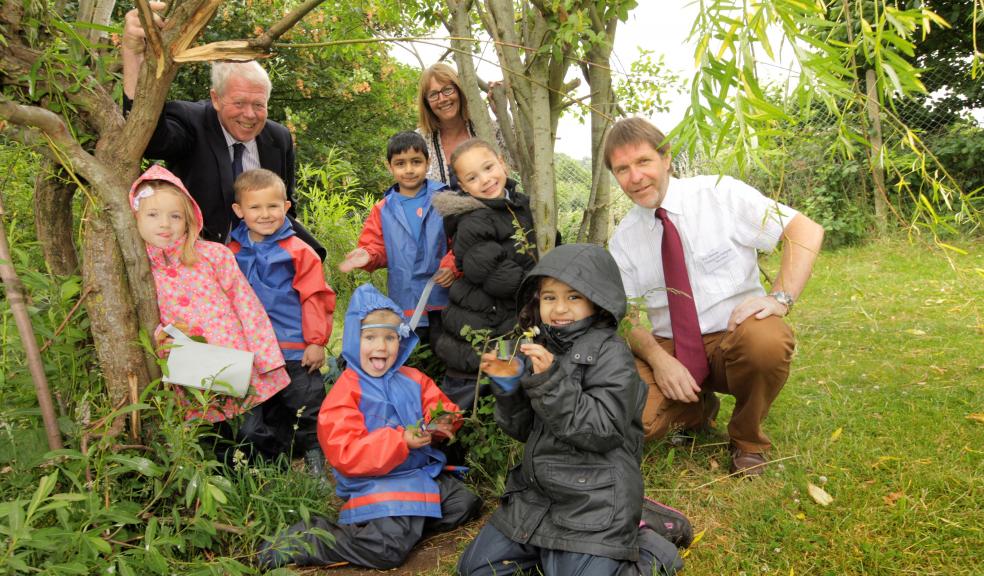
Making the connection: Major project launches to help children learn outdoors
A ground-breaking project which aims to significantly increase the number of school-aged children experiencing the full range of benefits that come from learning outside the classroom in natural environments has been launched today (Tuesday 2 July) at Glenfrome Primary School, Bristol.
The Natural Connections Demonstration Project is set to run for the next three years and aims to work with 40,000 children in 200 schools across the South West from Cornwall to Bristol. Funded by the Department for Environment, Food and Rural Affairs (Defra), Natural England and English Heritage, and delivered by Plymouth University, it is one of the largest outdoor learning projects in the UK.
Despite increasingly robust evidence demonstrating the benefits of childhood experiences taking place in nature, recent surveys show that the vast majority of our children are rapidly losing connection with their local natural environments. Children from deprived communities are particularly disadvantaged, and the aim of Natural Connections is to support teachers working in schools which currently provide little or no learning in natural environments.
The project will support teachers in taking over 40,000 children outside to learn, using activities and venues to inspire both children and teachers to excel in subjects from across the whole curriculum. From mathematics to music, biology to physics, languages to literature – the aim is to enable children to access the benefits of learning outside.
Evidence shows that teachers face a number of challenges when planning lessons outside – from uncertainty about where to access high quality learning resources, to lack of knowledge about suitable and accessible locations for outdoor learning experiences.
The Natural Connections Demonstration Project will:
- Work closely with teachers and local providers of outdoor activities to find the most appropriate support to meet teachers’ needs for supporting ‘learning in natural environments’.
- Create a sustainable support network, encouraging collaboration with other schools, and fostering links with local communities by recruiting up to 500 volunteers over the three-year period to help teachers deliver outdoor learning.
- Identify ‘beacon schools’ that are already actively engaged with outdoor learning. Beacon schools will support other local schools which provide little or no regular learning outside the classroom.
- Deliver at a local level through five ‘hubs’ in Plymouth, Torbay, Cornwall, North Somerset and Bristol. A key feature of the project is to test this regional model, which could then be replicated in other parts of the country.
- To complement today’s Natural Connections launch, an online resource has been specially created for teachers. For the first time, teachers can easily find local support in one place. They can find outdoor lesson plans and places to visit, share ideas and experiences, and identify sources of additional funding for outdoor projects. This new service is being hosted on Farming and Countryside Education’s (FACE) Growing Schools web site: www.growingschools.org.uk .
The web service will go live on Friday 5 July, to coincide with ‘Empty Classroom Day’ – a day which celebrates all the teaching activities which already take place in the fresh air, and to encourage even more outdoor learning in the future.
Richard Benyon, Minister for the Environment, said: “Every child should have the opportunity to experience and learn about nature. This initiative will help to remove the barriers to schools teaching outdoors, and let more children learn how and why they should care about their local parks and other green spaces.”
Poul Christensen, Chair of Natural England, said: “This is a truly innovative project, and a fantastic example of everyone working together to make nature’s classroom accessible to the very children who need it the most. It represents a more integrated way of working, gives schools and teachers more of what they need, and it will streamline local support – making it more accessible and effective.”
Sue Waite, Plymouth University’s Lead for Natural Connections, said: “We’re aiming for volunteers and community groups to help deliver a multitude of exciting learning activities in natural green spaces near to schools, with the aim of energising and motivating the pupils and improving their overall performance. Teachers are being supported to maximise opportunities for outdoor learning. Natural Connections is a unique programme and has the potential to forge even stronger connections between local communities and schools.”
Inger O’Callaghan, Head Teacher at Glenfrome Primary School, Bristol, said: “We know that learning outside in local green spaces can have a wonderful, transformative effect on children. Their physical health and mental wellbeing improve, their behaviour and attitudes change, and their knowledge of the subjects also deepens. It’s a win-win situation for teachers, children and their families.”
Sandra Stancliffe, Head of Education at English Heritage, said: “This is one of the most significant education projects happening today and English Heritage is delighted to support it. Natural Connections complements perfectly our Heritage Schools programme and we are working closely together so that a new generation of children can experience the joy and wonder that learning about our natural and built heritage brings.”













